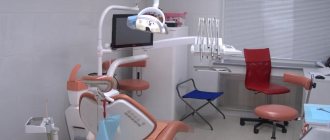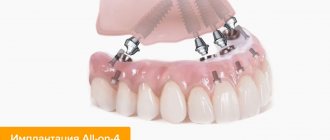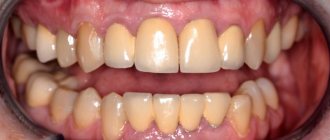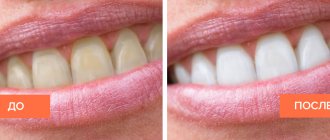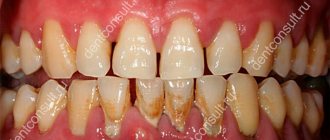Implantation is recognized as an advanced method for restoring lost teeth. This popular technique is used by dental centers all over the world. Manufacturers from different countries produce high-quality structures for implantation that restore the dentition and aesthetic qualities of a smile.
Many patients have heard about the benefits of installing implant systems, but not many know about the disadvantages of such treatment. In the article we will consider all the disadvantages of dental implants, reviews
patients and possible health risks after the procedure.
General information about the dental implant procedure
The essence of implantation is the restoration of a lost tooth or several units in a row by implanting an artificial root into the jaw bone, followed by installing a dental crown on the implanted pin.
Dental implantation takes place in several stages:
1. Examination and preparation of the patient’s oral cavity. In the presence of caries and other dental diseases, implantation is not performed. Initially, diagnostics are performed using hardware techniques, then the doctor carries out all the necessary treatment procedures to eliminate the identified diseases. If the patient has chronic diseases of various organs and systems of the body, he will also have to undergo an examination by specialized specialists, who must give an opinion on the possibility of safe dental implantation.
2. At the second stage, dental implants are implanted
. This is a surgical procedure performed under anesthesia during which the doctor implants an artificial root into the jaw bone and installs a temporary crown.
3. Several months should pass after the second stage. This time is allotted for the complete engraftment of the artificial root. If during this period the patient does not experience complications, the implantation is completed with the installation of a permanent crown. Externally, such a tooth cannot be distinguished from a real one. It also performs all chewing functions and withstands the various stresses associated with eating solid food.
Dental implants vary in shape, material and other technical parameters.
What are the types of dental implants
there are:
1. By installation method: intraosseous, extraosseous, mini-implants, cortical, basal, zygomatic.
2. By type of thread: compression, self-tapping, combined.
3. By type of material: titanium, zirconium, ceramic.
4. According to the size of the artificial root: short up to 10 mm, classic - within 20 mm, elongated - over 20 mm.
5. Shape: cylindrical, root-shaped, disk, combined, lamellar.
Before installing an artificial tooth, the patient needs to decide on the choice of implant, listening to the recommendations of the attending physician.
Does the reliability of structures really depend on their price?
According to the price segment, there are designs of three classes: premium, medium, economy. Premium implants have the highest price. They are made from high-quality materials - pure titanium and zirconium. Cheaper models are made from titanium alloys. Premium systems offer a wider range of application possibilities in different clinical cases - they are easier to install and have a wide selection of orthopedic elements. Therefore, their reliability compared to economical models is significantly higher.
What are the contraindications to the procedure?
Not every patient can have dental implants, due to a number of contraindications.
Contraindications to implantation:
- diabetes mellitus type II;
- cardiovascular pathologies;
- AIDS, HIV;
- hepatitis;
- open tuberculosis;
- bruxism;
- malocclusion;
- inflammatory diseases of the oral cavity;
- poor blood clotting;
- low immunity;
- mental illness;
- oncology;
- venereal diseases;
- allergic reactions.
Implantation is not performed during pregnancy, lactation, during exacerbation of chronic diseases, or in patients under 20 years of age.
An implant is an imitation of a tooth with a root system.
The implant imitates only the main part of the tooth, which is visible from the outside, but it does not have a root system. Instead, all the main functions are performed by a special titanium pin, which is fixed in the tissues and holds the entire prosthesis.
There is simply no point in visually simulating the root system. Firstly, it is not visible (only on an x-ray). Secondly, it is enough to imitate the main part of the tooth.
Rehabilitation period
After installation of the artificial root, a rehabilitation period begins, which is quite painful for the patient.
Symptoms that occur during the rehabilitation period:
- severe pain in the oral cavity;
- swelling and hyperemia of the gums;
- bleeding from gum tissue;
- increase in body temperature.
If the outcome is favorable, all of the above symptoms disappear a few days after the procedure. If relief does not occur, the pain intensifies, purulent discharge or other unfavorable symptoms appear, the patient needs to urgently visit the attending physician, as these signs indicate the addition of a bacterial infection.
Types of implants
In dentistry, implants made of titanium material are used, since it is considered the most reliable and safe. All products are divided into several types according to design and shape. Depending on the indications, the most suitable installation option is selected. In addition to indications, the choice of implant model is also influenced by their cost. Modern designs tend to be more expensive, but more convenient and durable.
Based on the type of design, products are divided into two types: collapsible and non-collapsible. This characteristic affects the service life only due to the need to replace the crowns. Thus, fixed structures may require a complete replacement of the prosthesis after 5–16 years, while removable ones can last up to 12 years.
The duration of operation is affected by the shape of the artificial roots, since the reliability of the installation of the prosthesis depends on the type of implant.
- Lamellar - screwed into the bone tissue located under the palate;
- Root-shaped - installed in root canals;
- Combined - combine both previous types and are placed in the root canal.
Pins screwed into the root canal are considered the most durable, since with this type of installation it is possible to achieve excellent fixation.
Based on the material of manufacture, they are distinguished between ceramic-metal products with a guarantee of about 12 years, ceramic products - about 7 years, and metal-plastic products - no more than 3 years. There are also implants made of aluminum and zirconium, their service life is more than 15 years.
What not to do after implantation?
After installation of a dental implant, the patient must responsibly follow all prescriptions and recommendations of the treating dentist.
Basic rules and prohibitions:
1. To avoid the development of infections in the oral cavity during the postoperative period, the patient needs to carefully care for the oral cavity, take medications as prescribed, avoid alcohol intake, and consume warm soft foods and drinks.
2. Avoid any physical activity for a week after implantation.
3. The dental implant must not be subjected to mechanical stress.
4. For some time after the procedure, you cannot visit the bathhouse or sauna; the patient must avoid overheating and hypothermia.
5. If the first signs of complications or implant rejection appear, immediately consult a doctor.
How often does the body reject an implant?
When dental implantology first appeared, cases of implant failure were common. This was due, on the one hand, to the little practical experience of the dentists of that time, on the one hand, and to insufficiently high-quality implants, on the other.
Nowadays, implant failure is extremely rare. Firstly, over half a century of the technology’s existence, enormous experience has been gained. Dentists at prestigious clinics almost never make mistakes during the preparation and performance of operations. Secondly, modern implants are made from biologically inert materials that the body does not perceive as something foreign. These are titanium, titanium alloys, and zirconium. Zirconium implants are the most expensive.
At the same time, there is still a negligible risk of implant rejection. This can happen due to the fault of an inexperienced surgeon, due to non-compliance with the doctor’s recommendations in the postoperative period, or due to emerging diseases.
Is it possible to do MRI diagnostics if you have a dental implant?
Many patients have the following question: is it possible to have an MRI with a dental implant?
? Dental implantation is not a contraindication to MRI diagnostics. Some structures made of non-inert metals may distort the results of the study.
In order for the diagnostician to correctly set up the MRI machine, the patient must show documents (special passport) received at the dental center, which will contain all the information about the installed dental implant.
Why is there a risk of rejection?
No manufacturer or dentist can claim that an implant will not be rejected 100%, since sometimes a complication occurs simply due to the body’s individual reaction to a foreign body.
The guarantee provided by dentistry is to protect the patient from complications in the event of rejection:
- due to a doctor’s error during installation (failure to comply with sanitary standards, incorrect installation, etc.);
- due to inconsistency of product quality.
If the patient did not follow the recommendations, or the implant was rejected after 2 - 4 years or more, then we are not talking about a medical error or poor quality. Most likely, pathological processes are occurring in the patient’s body, which become the cause. In such cases, the clinic, of course, does not bear responsibility.
Note! According to statistics, implants are rejected in only 2% of patients.
Dental implantation at Aesthetics dentistry
Despite the disadvantages of implantation, this method of restoring lost units is still considered the best and most effective. The dental clinic employs highly qualified doctors who perform high-quality dental implantation with minimal risks of complications. This is confirmed by positive patient reviews.
The specialist conducts a competent examination of the patient’s oral cavity, studies personal history, and only then makes a decision on possible dental implantation, without adverse consequences for the patient.
The center uses high quality implants from the world's best manufacturers. All patients who leave reviews on the site are given a 3% discount on dental implantation and other dental procedures. The first consultation examination is free!
Factors affecting service life
Having decided to undergo implantation, you must first familiarize yourself with all the requirements for the reliability of products. The average service life of dental implants is 15 years, but when counting on installing a reliable design, you need to understand that the cost will not be cheap.
Criteria for the characteristics of implants:
- strength - resistance to constant loads;
- product quality;
- type of production technology;
- material of manufacture;
- installation method.
A major role, as already mentioned, is played by the patient’s health status. Before implantation, oral approval should be performed. The presence of even minor inflammation or caries suggests a risk of implant rejection.
An important point is the professionalism of the doctor. if the structure itself is not installed securely, then most likely the pin will move or fall out.
Manufacturer and Dental Warranties
When implanting, it is better to know well-known manufacturers that have positive reviews. As a rule, you can always find information about certain implants and how long the products of a given manufacturer last. However, it is worth considering that dentistry and the manufacturer give different guarantees, since the manufacturer is based on the characteristics of the product, and the dental company takes into account the operating conditions.
Implants come in budget, medium and premium classes. Manufacturers such as AstraTech, XIVE Friadent and Nobel provide a lifetime guarantee; their products are premium and have increased strength and healing rates.
Average-priced implants have a service life (from the manufacturer) of an average of 20 years. The manufacturer's warranty for artificial roots is no more than 10 years.
Dentists, as a rule, establish a guarantee of no more than 3 years, since patients often do not follow the doctor’s recommendations for care throughout the entire period of use. The guarantee provided is confidence in the work done by the doctor.
